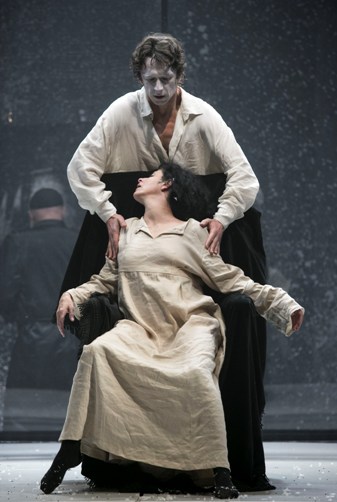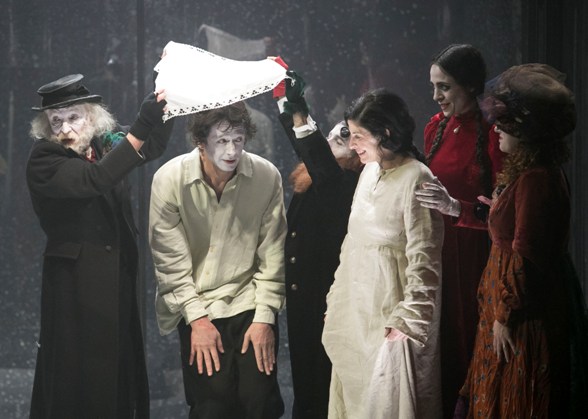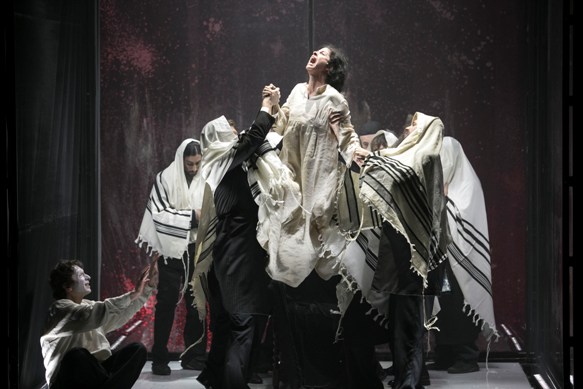Love hurts. The Felice and Boudeloux Bryant song has a long history, from the sweet harmony of the Everly Brothers, to the alt country edginess of Gram Parsons and Emmylou Harris, and my current favorite, the Nazareth 1975 hard rock cover. The passage of time and changing paradigms transform custom and expression, yet the essence remains. Love hurts, yet we never cease to long and yearn, to imagine its pleasures, to seek it out though it may elude us, to follow where it leads, even into the darkest abyss of the human soul.
The Dybbuk, a tale of love and possession written by S. An -Sky a century ago, has come to possess a unique hold on Israeli culture, a reliquary of myth, instilling a longing to release it from its spell of history, and infuse it with new life.

The Gesher Theatre production of The Dybbuk, inspired by An – Sky’s classic, written by Roee Chen and directed by Yevgeny Arye, is an extraordinary work of theatre. A captivating manifestation of the heart and mind onstage, weaving its spell of imagination, leaving the viewer suspended between doubt and belief, wondering and filled with wonder.
The Dybbuk begins with a wail, a prayer, a song. Hanan (Sasha Demidov), a scholar drawn to the study of Kabbalah, appears suspended between earth and sky, hovering in a darkness illuminated only by the moon and stars. Torn between his love of God and his love for Lea (Efrat Ben-Tzur), he believes in a life of the spirit that does not acknowledge the life of the flesh and sees it as a failing, the body’s betrayal. Despite his attempts to deny this desire, Hanan calls out in the night: “Lea fills my soul.”
Hanan loves Lea, yet he has never revealed his love. Soon, all too soon, it will be too late… or will it?
The veil of darkness lifts, and what had appeared to be the supernatural levitation of an inspired spirit, is now revealed to be Hanan, sitting on the roof of the Shtibel where the men are now reciting their morning prayers. It is a song, a dance of community, as the men bow and pray wrapped in their tfillin, a community of black and white, where there is an order to everything, rules to abide by, and the borders between what is permitted and what is forbidden are clearly demarcated.
The borders between right and wrong, body and spirit, individual and community, life and death, self and other, will all come into question in the space of this performance. The Dybbuk does not seek to supply answers, generating forces of tension within a vibrant, colorful theatrical performance to create a profound emotional experience.
If An – Sky’s Dybbuk presents its characters as folkloristic archetypes – the young virgin bride, the poor Yeshiva student, the merchant – then here one is presented with a contemporary sensibility and characters who possess a psychological depth. As the tale unfolds we see them in their moments of longing, satisfaction, repression, ambiguity, selfishness and regret. They cannot be reduced to a string of words, sentenced to a single aspect, they come to life on the stage in all their human frailty and complexity.

The staging is most striking, so much is communicated through movement and composition, in relationship to the set and costumes. A large transparent cube on the stage takes on different functions, consistently denoting a separation between two worlds, a barrier that is invisible and yet ever-present. Taking bold advantage of the effect of the stage, where the imaginary and the real join hands, the supernatural here makes a most comforting entrance in the form of Lea’s dead mother Hana and other departed relatives. While the community of the living is garbed in stark black and white, bound by obedience, conformity and other laws of human design, the community of the dead are a colorful crowd, free to follow their heart and speak their mind. Hana, (Neta Shpigelman) Lea’s mother, not only offers a visual nod and wink to the legendary Hana Rovina (inscribed in the collective consciousness as the Lea) with her long black braids and dark-rimmed eyes, a crimson dress replacing the virginal white gown, she is also the voice of the heart, the innocent “what if?” that hopes for a happy resolution, however unlikely it may be.
Sound and movement create one of the most poetic scenes in the play, as Lea’s father Sender (Doron Tavori) celebrates his daughter’s marriage with a feast for the poor, the lusty, inebriate roar of excess, while outside, the wind wails, and the lonely violinist (Boris Portnoy) plays a tune among the graves. We see both scenes, but the sounds shifts between the two, the world of the living and the world of the dead, the body and the spirit.
Hanan is devoted, obsessed, he offers the silent and repressed Lea something that the tangible life around her cannot provide, the scenes between Lea and Hanan are suffused with beauty. Whether one chooses to interpret Lea’s dybbuk as demonic possession or psychological ailment, one cannot deny the allure of its pleasures as well as its torments.

Sasha Demidov’s Hanan is a winsome other-worldly creature, his head filled with strange mystical thoughts, the supernatural is his natural element, and the connection with the silent, retiring Lea is an impassioned meeting of opposites. Efrat Ben-Tzur gives us a repressed Lea, accustomed to keeping her thoughts and desires to herself, yet conveying the sense of emotions deeply felt. The scenes of possession, which might so easily descend to melodrama, are portrayed with a controlled restraint, her every look and gesture revealing a communication with another world, visible to her eyes alone. Doron Tavori’s Sender is a master performance by a master of the art, the rough merchant ready to take a bite out of life, boldly going forward with the scheme designed to supply the greatest profit. It would have been easy to tag him the villain of this tale, were it not for the vulnerability with which Tavori imbues this crude man, exposing his tender feelings and failings.
The Dybbuk by Roee Chen, inspired by S. An – Sky; Directed by Yevgeny Arye; Set Design: Simon Pastukh; Costume design: Stephanie Graurogkayte; Lighting Design: Igor Kapustin; Music: Avi Benjamin; Sound Design: Michael Vaisburd; Choreography: Yehezkel Lazarov; Dramaturgy: Katya Sassonsky; Assistant Director for voice and speech: Yonny Lucas; Assistant Director: Daniel Styopin; Production Manager: Victor Sokolov; Yiddish Language and Culture Advisor: Mendy Kahn; Cast: Israel (Sasha) Demidov, Efrat Ben-Tzur, Doron Tavori, Fira Kanter, Mendy Kahn, Ori Yaniv, Gil’ad Kletter, Neta Shpigelman, Lillian Ruth, Alexander Senderovich, Noa Koler, Yevgeny Terlezky, Boris Portnoy, Olga Berezin, Henry David, Vitaly Fux, Adi Kvetner, Paulo E. Moura, Bat-El Papura, Ruth Rasiuk, Bar Sade, Angela Shteingart, Viktor Sokolov, Daniel Styopin, David Ziselson.





